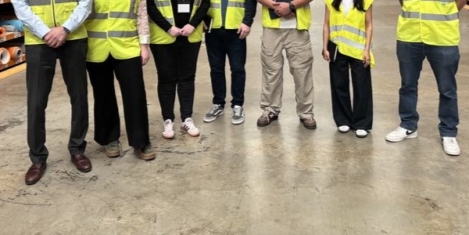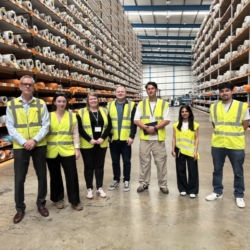To provide the best experiences, we use technologies like cookies to store and/or access device information. Consenting to these technologies will allow us to process data such as browsing behaviour or unique IDs on this site. Not consenting or withdrawing consent, may adversely affect certain features and functions.
The technical storage or access is strictly necessary for the legitimate purpose of enabling the use of a specific service explicitly requested by the subscriber or user, or for the sole purpose of carrying out the transmission of a communication over an electronic communications network.
The technical storage or access is necessary for the legitimate purpose of storing preferences that are not requested by the subscriber or user.
The technical storage or access that is used exclusively for statistical purposes.
The technical storage or access that is used exclusively for anonymous statistical purposes. Without a subpoena, voluntary compliance on the part of your Internet Service Provider, or additional records from a third party, information stored or retrieved for this purpose alone cannot usually be used to identify you.
The technical storage or access is required to create user profiles to send advertising, or to track the user on a website or across several websites for similar marketing purposes.
 UK GDP could be boosted by 4 percent – or £83 billion – if local areas with below-average productivity levels could make up half of the gap, according to PwC’s latest UK Economic Outlook. The report examines UK regional productivity, revealing wide variations in domestic productivity per job, as well as from an international perspective. PwC concludes that UK output per worker is around 10-15 percent behind Germany, France and Sweden and more than 30 percent behind the US. (more…)
UK GDP could be boosted by 4 percent – or £83 billion – if local areas with below-average productivity levels could make up half of the gap, according to PwC’s latest UK Economic Outlook. The report examines UK regional productivity, revealing wide variations in domestic productivity per job, as well as from an international perspective. PwC concludes that UK output per worker is around 10-15 percent behind Germany, France and Sweden and more than 30 percent behind the US. (more…)






 Employers are having to be more flexible to fill vacancies as buoyant demand for staff is creating recruitment challenges. Two in five (41 percent) employers say it has become more difficult to fill vacancies in the past year, while three in five (61 percent) employers said that at least some of their vacancies were proving hard to fill. However, according to the latest Labour Market Outlook from the CIPD and the Adecco Group despite the tightening labour market, this confidence has yet to translate into significant salary increases for all but new starters and those with key skills.
Employers are having to be more flexible to fill vacancies as buoyant demand for staff is creating recruitment challenges. Two in five (41 percent) employers say it has become more difficult to fill vacancies in the past year, while three in five (61 percent) employers said that at least some of their vacancies were proving hard to fill. However, according to the latest Labour Market Outlook from the CIPD and the Adecco Group despite the tightening labour market, this confidence has yet to translate into significant salary increases for all but new starters and those with key skills.


 In the same week that Gartner offered some useful insights into the building blocks for a successful
In the same week that Gartner offered some useful insights into the building blocks for a successful 



















January 28, 2026
Intentional AI adoption is a leadership challenge, not just a technology problem
by Molly Lebowitz • AI, Comment